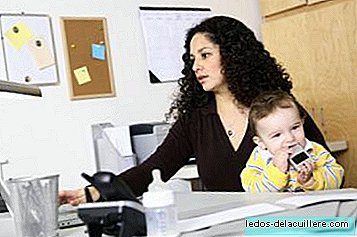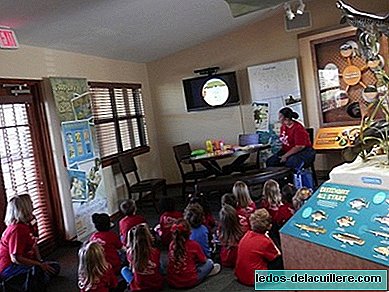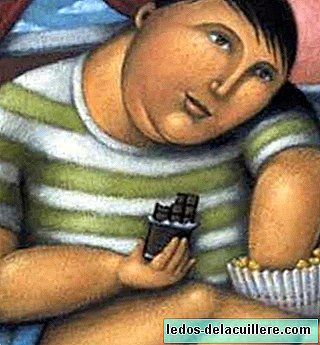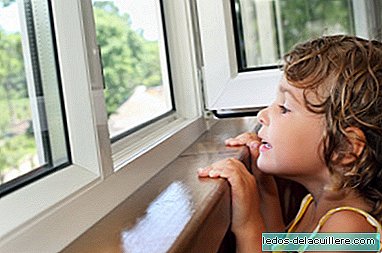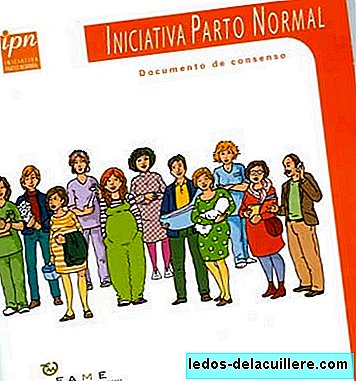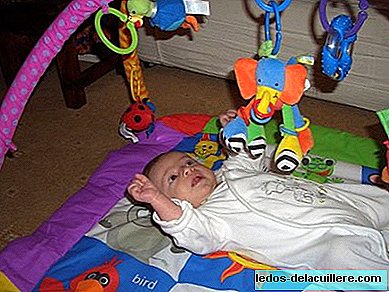
The educational toys They have always existed. Many of us have had a domino, memory games, etc., although for a while now more toys of this type have appeared, promising to increase the intelligence of children or by having them learn words, numbers, colors and even languages.
The clearest example of this type of toys are the "Baby Einstein" products (at least it is the one that I think has had more reception and therefore more sales), which consists of books, DVDs, stuffed animals with numbers, forms and integrated music (The stuffed animals that simply looked like a puppy were far away), etc.
These types of toys are having a lot of sales success because there are many parents who want the children's play times to serve as learning, to the point of getting, in some cases, to abuse them. It is for this reason that you have to be careful with the call "fearsome avalanche of educational toys".
Avalanche?
As we said a couple of days ago when we talk about children playing in an increasingly sedentary and individual way and toy brands will start making toys that promote this trend, if parents demand educational games, the logical thing is that there is increasingly More games of this style.
In the market we can already find stuffed animals with the alphabet in the belly, dolls that tell stories, phones that ask questions and wait for answers, food dishes with numbers and letters (I hallucinated when I saw them ... I guess the child "learns" with each bite , as the bottom of the plate shows), the aforementioned DVDs with music by classical music composers and much more.
What is wrong with educational toys?
Nothing, absolutely nothing. They are toys that have a very specific function that can help children learn specific concepts and that can serve as a stimulus and even as fun and, for all this, they should be taken into account as a valid gift option (as long as the toy is fun, there are some who are too much the "duster" and look more like a textbook transformed into a toy that a toy itself ... and if a toy is not fun, stop being a toy).
So what is the problem? You may ask. Let's say the problem is not in the toy itself, but in the use given to it.

To begin with, the term "educational toy" could be being used in a wrong way, because many other toys not considered as such can be educated and stimulated. For example, costumes make children play roles and play people who are not, using dialogues that children would not use as children. This causes them to train life itself, to put themselves in the role of adults and thus learn. Another example would be the well-known game of "La Oca" that we all know. You roll the dice and counts. Now it's my turn, now it's your turn. There are rules that must be followed, you can only roll the dice once, when you fall on one go you jump to the next one, etc ... Children learn to understand turns, learn numbers and count, learn rules and learn to win and (maybe ) to lose.
These are two examples explained like this by boat soon of toys (costumes and goose) that in themselves are not considered educational. However, after the explanation, does anyone dare to say that they do not help children learn? Does anyone dare to say they don't educate?
On the other hand, The main objective of providing children with games and toys is to offer them fun and happiness. The grace of the matter is that while they play, they learn.
When parents change the goal and try to take advantage of children's playtime to promote learning, we are, in a way, controlling children's fun and spoiling the true meaning of the word game. Let's say that, in a nutshell, we are providing children with toys in the hope of achieving results ("if I buy educational toys my child will be smarter or learn more than other children") and it is to enter a dangerous terrain of expectations and requirements
What is good about educational toys?
Well, nothing special. You could say that they are good about being another perfectly valid, useful and playable toy modality. This makes there more to choose from and it is easier to give children a variety of toys to play with and develop different aspects of their personality (instead of giving only cars to the child because it is what he likes most).
As for the subject of learning, we saw last year that Disney returned money from its "Baby Einstein" products because it was shown that it didn't make children smarter. Educational toys can serve to learn some concepts, words, numbers and even colors, but from there to make children smarter or smarter goes a long way.

Moreover, as we have said, all toys (or almost all), in one way or another, provide learning and stimulation to children to the point that a child who uses symbolic play a lot (play with dolls that dialogue with each other , for example), or who simply spends a lot of time with people who talk to him can learn many more words than the one in the story "My first words" or watch a DVD with the same title. I do not mean by this that each child has a learning rhythm, but that speaking more and better is usually learned by listening and speaking. Whoever watches TV listens, but does not speak ... (and if he speaks he receives no answer), so he learns less.
Why?
The last question would be to know why many parents are tempted to try to get their child to acquire concrete knowledge even when playing.
I imagine that it is a matter of competitiveness and concern for "titulitis." Formerly he who had a university career had a job almost secured. Now a career does not ensure anything and the one who wants to excel has to continue training by feeding the curriculum.
"If from a young age we start to make the child learn things and gain knowledge we will have a lot of gain", parents should think (like some parents I met who complained in school because in preschool they did not do English at age 3 and their daughter, who was doing English with 2 years in kindergarten, was going to lose the thread). The reality is that this phrase does not have to be fulfilled for a very obvious reason: people learn what they have an interest in learning and children, even more. For a person to learn or even for a person to do something, there must be a motivation and, when the motivation is more internal, better (an internal motivation to read a story would be the child's desire to know what he puts into it and a motivation external would be, for example, that the child read it in exchange for receiving a prize: "if you read the story I buy you ..."). That is why in the Nordic countries children have a very high reading comprehension, because when they learn to read at 7-8 years, they have a voracious desire to understand what it puts everywhere.
Concluding
He play is important for children because it makes them happy and fun and because they also learn and develop. Most toys provide fun and learning and for this reason we must offer our children varied toys and time to play with them.
All that is trying to control the playing time with more or less stimulating toys will be to direct the game towards our goal, not the child's, and towards our motivation: to learn more or to be smarter.
To what extent should we decide for them and should we control their time? Every parent that decides. I have it clear and my children too. The most educational cutting toys that have come into the house have been the least used and not because of this my children have learned less. Jon learned the colors playing to look for them in the cars ("negoooo, azúuu, vedeeee") and has learned to read at home asking at all hours "what does he put here ...", for putting two examples of important things he has learned without educational toys in between (and anyway, even if they had learned less than other children with educational toys, I would be calm watching them play, enjoy and be happy, without more ... because that is the goal of being a child).
Photos | Graeme Douglas, originallittlehellraiser, Nhy Nguyen on Flickr In Babies and more | Educational toys do not bring long-term benefits, Educating creativity: imagination is one of the best toys that exist, Baby Einstein does not help improve the child's language





